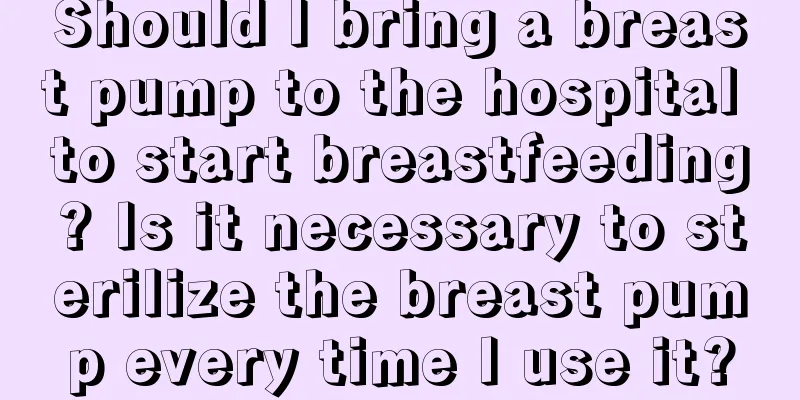Should I bring a breast pump to the hospital to start breastfeeding? Is it necessary to sterilize the breast pump every time I use it?

|
A breast pump is a tool used by mothers to feed their babies after the birth of a newborn. Many mothers are having their first child and don't know what to bring to the hospital for delivery. Is it necessary to bring a breast pump to the hospital for delivery? Should I bring a breast pump to the hospital to stimulate milk secretion?No. Women do not need to bring a breast pump when they go to the hospital to give birth. Generally speaking, after giving birth, the nurse will let the child suck the mother's breast to open the milk, and a breast pump is not needed. At this time, if there is too much milk and the baby cannot finish it, a breast pump is needed to suck it out. If the milk is enough for the baby and it is not too bloated, it is best not to use a breast pump. Is it necessary to sterilize a breast pump every time I use it?If the sucked milk is used to feed the baby, it needs to be sterilized every time; if the sucked milk is not needed, it is not necessary to sterilize it every time. We must pay attention to hygiene issues when using a breast pump. Not only should we clean the container but also the breasts. Whether the breast pump needs to be sterilized after each use depends on how the sucked milk is handled. If the sucked milk is discarded, it does not need to be sterilized. Just keep it clean before and after using the breast pump. If the sucked milk is retained, it is best to sterilize it after each use and store it dry for the next use. How to deal with the breast pump after useAfter using the breast pump, rinse it with water as soon as possible, try not to let the milk adhere to the breast pump, then wash it with hot water, put it on a clean paper towel or a special drying rack to dry naturally, try not to use a cloth towel to avoid bacterial infection. In addition, you can also use microwave disinfection or steamer disinfection. It is recommended that you clean it in time after each use to avoid long-term mold or bacterial infection, which may cause diarrhea or discomfort in the baby after consuming breast milk. What are the benefits of using a breast pumpIn fact, if necessary, you still need to prepare a breast pump. The breast pump is not only convenient for breastfeeding, but also has the function of unblocking the mammary glands. The breast pump is not necessary in the delivery bag, but if the milk is swollen after delivery, you need to use a breast pump to unblock it. The breast pump is actually a good auxiliary product in feeding. Using a breast pump can also stimulate milk secretion and increase milk production. If your baby is a premature baby or cannot suck the mother's nipples, using a breast pump to collect milk can not only allow the baby to eat precious breast milk, but also relieve the pain and pressure caused by swollen milk. However, it should be noted that the number of times you squeeze milk during swollen milk should not be too many, otherwise it will make the situation worse. And in more special circumstances, if the doctor recommends that you temporarily stop breastfeeding, for example, because you are taking drugs that may be harmful to the baby, or you need short-term hospitalization, then during this period when you cannot breastfeed your baby, using a breast pump to extract milk can continue to help you maintain adequate milk secretion. |
Recommend
How to treat bronchitis caused by cold in children
Young children are very susceptible to colds, esp...
How to deal with children who are grumpy when waking up? 4 tips to help them avoid being lazy in bed
Many babies at home have the habit of staying in ...
Can a three-month-old baby use a pillow? How many centimeters can a three-month-old baby use a pillow?
Pillows are something we almost always use when w...
Does obesity affect pregnancy? What are the effects of obesity on pregnancy?
As life improves, many women are facing the probl...
Does small breasts affect pregnancy? Does small breasts affect pregnancy?
Many girls are thin and have flat breasts, so the...
Can Blue Moon hand sanitizer kill bacteria? What are the ingredients of Blue Moon hand sanitizer?
Blue Moon laundry detergent has always been well ...
How to deal with children's rebellious period
It is normal for children to have a rebellious pe...
What is fetal toxin? What are the harms of fetal toxin?
Everyone must have heard of fetal toxicity in lif...
What to do if your baby has diarrhea 10 days after birth? 8 ways to avoid medication
Newborns are very fragile, and their gastrointest...
My baby is more than one month old and still has jaundice. What's going on?
Everything was normal after the baby was born, bu...
How to make children fall in love with reading
Children are smart and should learn to read from ...
Can pregnant women eat yam porridge? What should pregnant women pay attention to when eating yam porridge?
Everyone should have heard of a lot of food in li...
How to eat black beans to promote ovulation? When to eat black beans to promote ovulation?
When to eat black beans to promote ovulation? Wom...
Can black toothpaste whiten teeth? Can black toothpaste reduce inflammation?
Black toothpaste is a domestic brand, and has bee...
Is it better to have fluoride or non-fluoride toothpaste? How to choose the best toothpaste?
Toothpaste is a common item in our daily life. We...









